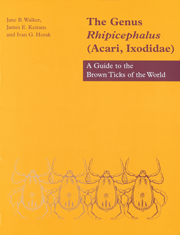Book contents
- Frontmatter
- Contents
- Acknowledgements
- 1 Introduction
- 2 Relationships of the ticks (Ixodida) and definition of the genus Rhipicephalus
- 3 Format for the accounts of individual species
- 4 Glossary
- 5 Rhipicephalus species names of the world
- 6 Rhipicephalus species occurring in the Afrotropical region
- 7 Accounts of individual species occurring in the Afrotropical region. pages 59 to 277
- Accounts of individual species occurring in the Afrotropical region. pages 278 to 490
- 8 Host/parasite list for the Afrotropical Rhipicephalus species
- 9 Rhipicephalus species occurring outside the Afrotropical region
- 10 Accounts of individual species occurring outside the Afrotropical region
- 11 Host/parasite list for the non-Afrotropical Rhipicephalus species
- 12 Species groups based on the immature stages
- 13 The transmission of tick-borne diseases of animals and humans by Rhipicephalus species
- Index
11 - Host/parasite list for the non-Afrotropical Rhipicephalus species
Published online by Cambridge University Press: 05 November 2011
- Frontmatter
- Contents
- Acknowledgements
- 1 Introduction
- 2 Relationships of the ticks (Ixodida) and definition of the genus Rhipicephalus
- 3 Format for the accounts of individual species
- 4 Glossary
- 5 Rhipicephalus species names of the world
- 6 Rhipicephalus species occurring in the Afrotropical region
- 7 Accounts of individual species occurring in the Afrotropical region. pages 59 to 277
- Accounts of individual species occurring in the Afrotropical region. pages 278 to 490
- 8 Host/parasite list for the Afrotropical Rhipicephalus species
- 9 Rhipicephalus species occurring outside the Afrotropical region
- 10 Accounts of individual species occurring outside the Afrotropical region
- 11 Host/parasite list for the non-Afrotropical Rhipicephalus species
- 12 Species groups based on the immature stages
- 13 The transmission of tick-borne diseases of animals and humans by Rhipicephalus species
- Index
Summary
Unless otherwise stated the records in the host/parasite checklist refer to adult ticks. The number in brackets appearing after a tick's name represents the number of collections made from the host species under which it is listed. When a tick's name appears in bold type this indicates that the animal under which it is listed is a preferred host of the adults. Large numbers of domestic cattle., sheep and dogs as well as Indian gerbils and Tolai hares have been examined for ticks within the distribution range of the non-Afrotropical Rhipicephalus species. The numbers of collections from these animals could give a false impression of host preference.
The host groupings under which the tick collections are recorded in the host/parasite checklist follow the same sequence as those in the host record tables accompanying the individual tick species accounts, namely domestic animals, wild animals, birds and humans.
DOMESTIC ANIMALS
Bos indicus/taurus
R. bursa (40)
R. haemaphysaloides (11)
R. pilans (5)
R. pumilio (2)
R. rossicus (8)
R. schulzei (1)
R. turanicus (150 +)
Bubalus bubalisWater buffaloes
R. haemaphysaloides (2)
R. pilans (12)
R. turanicus (3)
Ovis ariesSheep
R. bursa (91)
R. haemaphysaloides (5)
R. pumilio (1)
R. schulzei (1)
R. turanicus (many)
Capra hircusGoats
R. bursa (35, including immatures)
R. haemaphysaloides (8)
R. leporis (1)
R. pumilio (1)
R. rossicus (1)
R. schulzei (1)
R. turanicus (many)
Camelus dromedariusCamels
R. bursa (1)
R. haemaphysaloides (2)
R. pumilio (1)
R. rossicus (1)
R. schulzei (1)
R. turanicus (15)
Equus caballusHorses
R. bursa (10) R. haemaphysaloides (4) R. pilans (8, including immatures)
- Type
- Chapter
- Information
- The Genus Rhipicephalus (Acari, Ixodidae)A Guide to the Brown Ticks of the World, pp. 585 - 590Publisher: Cambridge University PressPrint publication year: 2000



